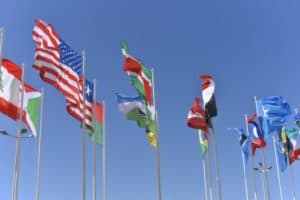This page contains affiliate links. This means if you a follow a link and make a purchase, at no additional cost to you, Humanitarian Careers will receive a commission. Thank you for supporting the site.
Most people join the international development sector because they want to dedicate their career to assisting people in need. International development work focuses on how improvements can be made in the economies, politics and societies of poorer countries. It’s definitely worthy work, and a fantastic career, but let’s face it, everyone has bills to pay…
…so, if you enter the international development sector, how much can you expect to earn? Well, that question is a bit like asking ‘how long is a piece of string?’
The international development sector is huge. It is made up of governments, NGOs, international organisations and multi-lateral bodies across almost every country in the world. As you can expect, because of this, salaries in the international development sector vary widely.
However, there some general rules that can be used to understand how much you’re likely to earn working in international development. Let us explain…
International Development Salaries: An Overview
The international development sector is essentially like any other industry when it comes to salaries. The more senior your job, the more you will earn. Wages in international development increase as roles require more skills, experience, knowledge and expertise. Jobs in development that require more responsibilities and risk management also get paid more.
As in other sectors, salaries in the international development are usually made up of a gross salary and net pay, social security benefits and taxes. Generally, international development workers do not get performance related bonuses like you might in the private sector, but can receive additional payments depending on the type of work and location they’re based in. We’ve gone over this in more detail below.
Wages in international development tend to be lower than in the private sector. Although this can seem discouraging, it is offset by knowing you are working for good causes rather than just to make profit for a company. You also usually get a slightly more relaxed working environment and frequent opportunities to travel and work abroad.
However, if it’s enormous salaries you’re after, maybe international development work isn’t for you.
Example International Development Salaries
Although the below is only meant as an example guide, it provides a rough estimate for what jobs within the international development sector pay.
| Level | Job Title | Salary Range (USD) |
| Entry-Level | Administrator | 23,500 – 32,000 |
| Entry-Level | Assistant | 23,500 – 35,000 |
| Mid-Career | Officer | 35,000 – 48,000 |
| Mid-Career | Supervisor | 37,500 – 51,000 |
| Mid-Career | Manager | 39,000 – 55,000 |
| Mid-Career | Coordinator | 41,000 – 62,000 |
| Senior | Advisor | 48,000 – 64,000 |
| Senior | Head of | 62,000 – 120,000 |
| Senior | Director | 62,000 – 140,000 |
| Senior | Consultant | 100 – 750 per day |
To really understand international development salaries and how much you can earn in the sector there are two main things you need to know. The first is the structure international development organisations often use for jobs and salaries. The second is the salary grid and the role this plays in determining international development salaries. Let’s going over each one…
International Development Salary Structures
As we said before, the international development sector is like many other industries when it comes to salaries. The more senior the role, the more it is paid. Although some international development organisations publish salaries for jobs in their advertisements, or link to their salary grid, most don’t, and so to understand what you can earn in the development sector you need to know the structure of jobs.
International development jobs have different titles depending on their seniority. Although each development organisation has its own structure, they generally follow the same rules in terms of job titles and therefore lower and higher wages.
As in most sectors, international development job titles are closely linked to what the job does, and therefore, also how much the person doing it can earn. Job titles in the international development sector generally follow this order of seniority from lowest to highest:
- Administrator
- Assistant
- Officer
- Supervisor
- Manager
- Coordinator
- Advisor
- Head of
- Director
- Consultant
Although you will find some international development organisations that have Head Of as more senior than Director or Supervisor above Manager, this is generally a good structure to have in mind when thinking about international development salaries.
Therefore, using the above structure, we know that in the development sector a Finance Administrator is paid less than a Finance Officer and a Logistics Assistant has lower wages than Logistics Coordinator.
International Development Online Courses
If you want to know about how much international development workers earn, we recommend taking an online short course. We think the Management of International Development: Towards Agenda 2030 course is great. It looks at the current international development model as well as the trends that will be key to global development in the near future. Follow the link to the course’s page for more information.
We also think the online course Sustainable Development in the 21st Century by Yonsei University to be one of the best for those interested in international development. Delivered by former UN Secretary General Ban-ki Moon, the online course would be a great addition to the CV of anyone looking to work in international development. The link is to the course’s page.
If you are interested in the practical methods used on international development projects, we recommend the online course How To Design & Fund International Development NGO Projects. The course teaches students the tools needed to establish and run impactful development projects. Click the link to visit the course’s page for more information.
Understanding Salary Grids
All international development organisations will have a salary structure, or pay scale. This is usually known as a salary grid and groups jobs within salary bands and dictates the maximum and minimum a person in that role can get paid. Some development organisations publish their salary grid. Sadly, most do not.
It’s important to know that all international development jobs have an allocated position with the salary grid and this will control how much the job is paid. Most international development organisations salary grids go up in bands with each band increasing the salary by around 20%.
This means, for example, entry-level international development jobs at an agency may pay between 21,000 USD and 24,300 USD a year and be in salary Band A. The next band up in that development organisation would pay between 25,500 USD to 29,500 USD – roughly a 20% increase. This would be Band B. Salaries would then increase in 20% bands all the way up in seniority.
However, all international development organisations pay different salaries at each level. They also all obviously structure their salary grids definitely. Although understanding the basics of the salary grid is a good start, it won’t tell you everything about how much you’ll earn working in international development.
If you’re looking at an advert for a development sector job and it says something like ‘this role is paid at grade D7’, this is a reference to the organisations salary grid. Have a quick Google to see if they have it published online.
Are International Development Salaries Negotiable?
Most salaries in the international development sector are negotiable. However, you will only be able to negotiate within the salary range set for the job and this will limit how much you can add to the offered salary.
Jobs in the international development sector either have the salary listed on the job advertisement or you are told the salary during the interview process. Sometimes you need to wait until a job offer is made to get actual confirmation of the how much you’ll earn in the role.
When an international development agency posts the salary for a job on the advertisement, they often give it as a range rather than a set figure. If you have to wait until the interview stage to learn the what you’ll be paid, they may give you the actual amount you’ll or also give a range.
If are taking a job in the development sector and want to negotiate your salary then if the job is advertised with a salary range you can make a case based on your previous skills and experience as you why you should earn at the top of the salary bracket. Note that you won’t really be able to negotiate above the salary range the development organisation is giving.
If the international development organisation you are applying to has given the salary for the job as a straight figure, you can also try and negotiate a higher rate. However, it’s important to remember the job will have a place on the salary grid, and you won’t be able to negotiate it higher than what the salary grid range has for the role.
This is made easier if you can see the development agencies salary grid. If they don’t publish it, expect not to be able to negotiate more than about 10% – 20% higher than what they have offered.
How Salaries Can Vary
One thing that makes salaries in the international development sector unique, compared perhaps to other industries, is the large variation there can be in how much jobs are paid.
The international development sector is huge and covers organisations working in almost every country of the world. The development sector also has many organisations with headquarters in one country and offices across many more implementing projects.
As a result, salaries in international development can vary widely.
The first way earnings in the development sector can vary is between the countries you may work in. Salaries in countries with a very low of cost-of-living will be lower than what you make in more expensive countries. In this way the international development industry is similar to most other lines of work.
Another, and more annoying way salaries vary in international development is that different development agencies can pay vastly different wages for essentially the same job. For example, it can be common for one development agency to pay the role of Field Coordinator in a county almost twice what another pays their Field Coordinator, despite them being the basically the same job with the same title.
What you earn working in international development sector can also alter depending on which parts of the sector you work in. The United Nations and other international organisations generally pay more than development NGOs. Development jobs with governments can also have different salaries depending on how each government agency pays.
Salaries in international development can also alter between different regions. Generally, French, Spanish and Italian development agencies pay less than Scandinavian or American development organisations. British development workers earn kind of in-between. These are not complete rules, but definitely good generalisations.

Additional Benefits
When thinking about working in the international development sector it’s important to know that there are many additional benefits on top of your salary that can be earned. Although the development sector doesn’t pay performance related bonuses like the private sector, many organisations provide extra benefits to staff. We’ll go over the main ones here.
One of the main benefits you can gain on top of your salary when you work in international development is known as hazard pay. Many jobs in development require you to work in difficult and sometimes dangerous places. Development organisations can add an additional payment to your salary, often of between 10% – 30% as an incentive to work in these areas.
Another addition you can have to your international development pay-packet is health insurance costs. Many development organisations, such as the UN, provide costs towards staff health insurance in addition to their salary. Also, as many development workers travel abroad frequently, you can receive additional travel insurance on top of your salary.
If you are traveling for work with an international development organisation, they will cover your travel costs in addition to your salary. This will include flights and accommodation. As development workers can travel a lot these costs can be great addition to your monthly earnings. Some development agencies also give staff a per diem to cover food and other expenses whilst they are abroad.
When you’re working for an international development agency abroad longer-term, they will provide you with housing in addition to your monthly wages. Usually this will be in a guesthouse or apartment the development organisation rents and pays for. However, some development agencies in some locations give additional money to staff to cover their accommodation costs.
For very senior roles, another benefit international development staff can receive on top of their wages when they work abroad is the cost of schooling. Senior staff working abroad for long periods of time can sometimes relocate their family and in these cases development organisations give additional benefits on top of their salary for their children to attend school.
A final area of benefits that development workers may receive on top of their salary is relocation costs. Some international development organisations provide additional money for staff that move long-term to a new country. This money covers shipping, travel, finding a new apartment and other moving costs. It is usually a one-time payment made on top of the staff’s wages.






